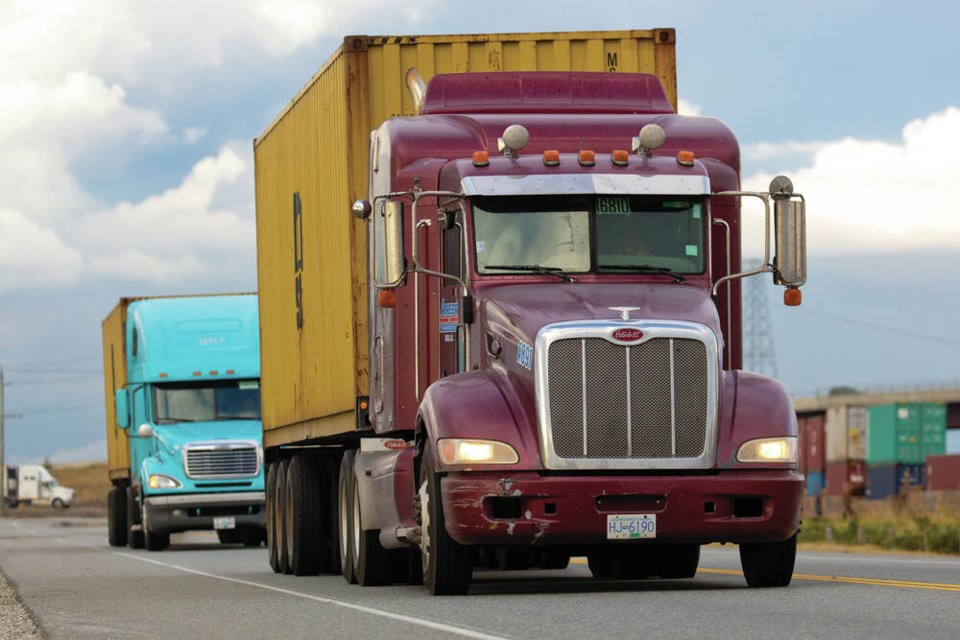A report from Metro Vancouver Regional District’s air quality department says there is “growing evidence” B.C. truck drivers are “tampering” with emission controls on their vehicles — a phenomenon confirmed by the BC Trucking Association.
The report, from air quality planners John Linder and Sara Muir tabled Oct. 3 at Metro Vancouver’s climate action committee, states tampering of medium and heavy truck (MHT) emission control software is a concern in meeting local nitrogen dioxide particulate and greenhouse gas emission targets.
“If tampering proves to be widespread, Metro Vancouver’s emission inventory likely underestimates emissions of health-harming air contaminants from MHTs,” the report states.
While the region, province and country have zero emission transportation goals for the future, the report notes several challenges, including tampering, in meeting those goals.
The authors highlight alternative policies to reducing harmful particulates and carbon dioxide emissions from trucks, which account for about 12 and five per cent of human activity in the region, respectively.
'The cold, hard truth'
The need for alternatives — such as renewable biofuels and short-sea shipping of containers, per the report — is evident because zero emission goals for MHTs are not attainable under current realities, said Dale Earle, president and CEO of the BC Trucking Association.
“We’re not there yet and it’s really frustrating” to face some of the regulations in place or about to be put in place, said Earle.
“The cold, hard truth is there is no mathematical way we can get to emission targets using zero emission vehicles,” said Earle, noting no electric truck can make it even halfway up the Coquihalla Highway.
Even if they could, he said, he estimates a facility with about 150 commercial vehicle chargers using the power capacity of a city of 20,000 people would be required.
“The problem we have, particularly in B.C.. is the topography. Right now there’s no heavy vehicle that can move a load from the Fraser Valley up the [Coquihalla],” explained Earle.
Meanwhile, Earle said emission control software on trucks is hurting fuel economy and causing engine problems after sustained long hauls, leading to tampering in about 30 per cent to 50 per cent of the fleet, according to his estimates of a common but illegal process known as a “diesel deleting."
“So even if you win, you lose,” said Earle, explaining that emission controls don’t work as well on short hauls because the engines don’t heat up enough to destroy particulates.
It’s a matter Metro Vancouver is likely to investigate with Linder commenting at committee Thursday: “Why are they tampering? Is it to save money or is it because the technology isn’t working? We want to ensure we have a clear understanding of that.”
'Need to get real serious'
Earle said zero emission trucks will do fine for local transportation routes.
“We need to get real serious and do more with what we have,” said Earle citing other measures, including a “brilliant little program” that recently faced cuts from the provincial government.
An example of a solution to reduce pollution and greenhouse gases is auxiliary power for trucks and plug-in outlets at truck parking lots, akin to “shore power” at ports.
Doing so would mitigate the fact an average truck idles 1,800 hours a year because the driver needs air conditioning in the summer and heat in the winter, added Earle.
Other alternatives highlighted in the report include examining rail and short-sea shipping, the latter of which would see more transportation of containers and trucks on barges around the region and to destinations further abroad, such as Vancouver Island.
But, Linder notes, there is a lack of both rail lines and port terminals in the region designed to enable short-sea shipping, although the regional government is assisting other governments find new locations.



